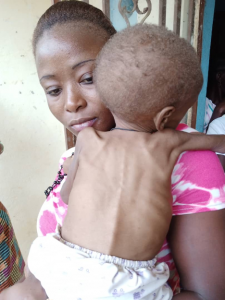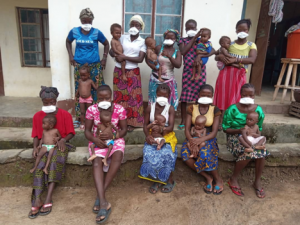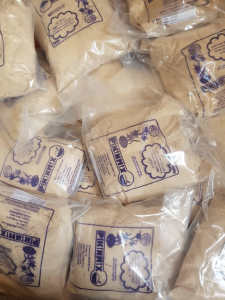
Back in January 2020 before the COVID-19 pandemic, RHCI volunteers Julie and Alexa Hoffer traveled with a team from Minnesota to Tikonko. They spent time observing at the RHCI Motorbike Outreach Clinics in several villages and came back with helpful observations. Julie and Alexa reported that a large number of children under five attending these clinics for medical illnesses were also malnourished, leading to their recommendation that RHCI should start a program to provide medical treatment (RUTF or Ready to Use Therapeutic Food) at the Motorbike Clinics.
To develop and administer this program, in May RHCI hired nutritionist Umu Shour who has a degree in nutrition from Njala University, as well as nursing degree. Immediately, Umu began attending all motorbike clinics, evaluating the children for malnutrition, and with RHCI’s help, providing the most malnourished children with Pikinmix, a locally sourced highly nutritional food.
In the month of May, 36 children were diagnosed with moderate or severe malnutrition. By the end of August, Umu had enrolled 97 children meeting the WHO criteria for Moderate Acute Malnutrition (MAM) or Severe Acute Malnutrition (SAM). Sixteen children had been successfully treated by the end of August and discharged from the program.
In August, Umu expanded the malnutrition program to include the areas of Kassama and Sembehun Tarbema. Pictures from these two Peripheral Health Units demonstrate the acute needs of the children.

The malnutrition program also includes an emphasis on education and teaching caregivers how to feed their children, the types of foods, and recipes using local nutritious foods. Each child is also evaluated to be certain they are up to date on Vitamin A, Mebendazole (deworming medication), and Immunizations. All children are evaluated for other medical illnesses and treated appropriately. If a child is unable to eat, or has a life-threatening infection, they are transported by RHCI vehicle to a hospital in Bo for treatment and refeeding. Per WHO guidelines, all children with SAM are treated with one week of antibiotics.
In 2019, RHCI sponsored the child malnutrition program Positive Deviance Hearth which provided two remote villages (Julian and Surgbehun) with in-depth programming for their malnourished children. Thirty children and their families participated and benefited. The current program which started in 2020 will reach a much larger number of villages and children.
The Child Malnutrition Committee in the US is learning from Umu and from materials provided below to understand how to diagnose and treat child malnutrition, a condition that is very uncommon in the US. The committee’s goal is to understand, advise and support the RHCI child malnutrition program in the Tikonko Chiefdom.
References:
Community based management of malnutrition: https://drive.google.com/drive/u/1/folders/1HKR6SbJ22qUwhz_Dj9zOmftgNLAmi1W6
Management of malnutrition: https://drive.google.com/drive/u/1/folders/1HKR6SbJ22qUwhz_Dj9zOmftgNLAmi1W6
WHO Malnutrition: https://drive.google.com/drive/u/1/folders/1HKR6SbJ22qUwhz_Dj9zOmftgNLAmi1W6

